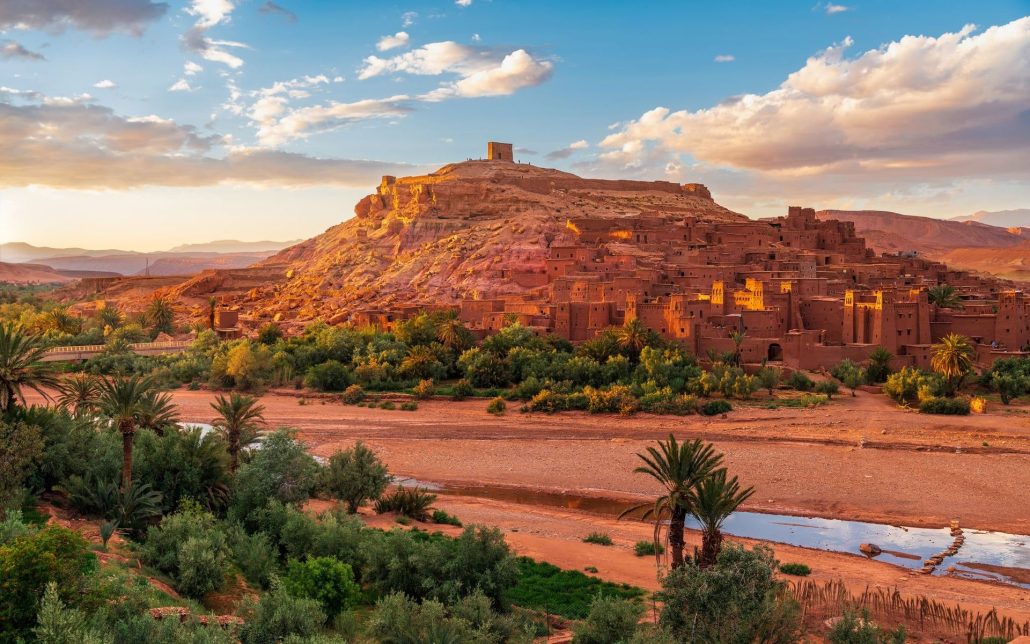Best Time to Visit Morocco - Morocco Tours and Trips
The best time to visit Morocco is during the spring months of March to May or during the fall from September to October when the weather is not too hot,
making it perfect for exploring the vibrant markets, majestic palaces, and scenic landscapes. These months are ideal for embarking on a Morocco tour, where various tour packages offer an immersive experience into the country’s rich culture and stunning natural beauty. Luxury tour and travel companies often curate tailored Morocco tours, including private Morocco tours that cater to those seeking an exclusive experience.
Whether it’s a desert tour exploring the vast Sahara or indulging in the best luxury Morocco tours, trips, and vacations, the moderate climate during these months ensures a comfortable travel vacation trip.
Morocco tour companies meticulously plan these itineraries to include the highlights of the country, making any month within this period the best to go to Morocco for an unforgettable experience.

Morocco, a land of diverse landscapes, rich history, and vibrant culture, offers a unique and enchanting experience throughout the year. When it comes to planning your visit, the timing can significantly impact your journey. In this guide, we’ll navigate through the seasons and events to help you find the best time to visit Morocco, from the bustling souks of Marrakech to the serene dunes of the Sahara.
Spring: March to May – Blossoms and Mild Temperatures
Why Spring is Splendid:
- Floral Delights: Morocco comes alive with colorful blooms, especially in the Atlas Mountains and the Valley of Roses.
- Mild Weather: Pleasant temperatures make outdoor activities enjoyable without the scorching heat of summer.
- Festivals: Witness local festivals like Moussem of Moulay Idriss II in Fes, filled with music, dance, and cultural celebrations.
Traveler’s Tip: Spring is an ideal time for hiking in the Atlas Mountains and exploring Morocco’s lush gardens.
Summer: June to August – Sahara Adventures and Coastal Escapes
Why Summer is Sizzling:
- Sahara Adventures: The summer months are the best time to experience the Sahara Desert’s magic, with clear skies and warm nights.
- Coastal Retreats: The coastal towns of Essaouira and Agadir offer relief from the heat, with pleasant sea breezes.
Beat the Heat: To escape the scorching heat, plan your outdoor activities for early mornings or evenings.
Autumn: September to November – Mild Weather and Cultural Festivals
Why Autumn is Awesome:
- Mild Days: Enjoy warm and pleasant temperatures across the country, perfect for sightseeing.
- Cultural Festivals: Experience the Fes Festival of World Sacred Music, a captivating celebration of music and spirituality.
Traveler’s Tip: Autumn is a photographer’s dream, with clear skies and vibrant landscapes.
Winter: December to February – Snow-Capped Atlas and Desert Comfort
Why Winter is Wonderful:
- Snowy Atlas Mountains: If you’re a fan of winter sports, head to the Atlas Mountains for skiing and snowboarding.
- Desert Comfort: While the northern cities can be cool, the Sahara Desert offers comfortable daytime temperatures.
Warm Clothing: Pack layers for city exploration, and be prepared for colder nights in the desert.
General Considerations:
Ramadan: Keep in mind that Ramadan, the Islamic holy month of fasting, affects the availability of food and drink during daylight hours. It’s a unique cultural experience, but some businesses may have limited hours.
Festivals and Events: Morocco hosts numerous festivals and events throughout the year, celebrating music, arts, and local traditions. Check the festival calendar and plan your visit accordingly to immerse yourself in the festivities.
Crowds and Prices: High season (spring and autumn) sees more tourists, so book accommodations and activities in advance. Low season (summer and winter) offers better deals but may have limited services in remote areas.
Local Insights: Don’t hesitate to ask locals for their recommendations on the best time to visit specific regions or attractions. They often have valuable insights.
Morocco Awaits, Anytime You Choose!
Morocco, with its diverse landscapes, vibrant culture, and timeless traditions, is a destination that can be enjoyed year-round. Each season brings its own unique charm and opportunities for exploration. Whether you prefer the blooming flowers of spring, the Sahara’s warmth in summer, the cultural festivals of autumn, or the snow-capped mountains of winter, Morocco has something to offer every traveler.
Ultimately, the best time to visit Morocco depends on your preferences and the experiences you seek. So, whether you’re wandering the bustling medinas, exploring ancient kasbahs, or stargazing in the Sahara, Morocco is ready to welcome you with its enchanting beauty and warm hospitality, no matter the season. Plan your journey wisely, and let the adventure begin!
FAQ about the best time to visit Morocco:
: When is the best time to visit Morocco? A: The best time to visit Morocco largely depends on your preferences and the activities you plan to engage in. Generally, spring (March to May) and autumn (September to November) are considered the best times to visit, as the weather is mild and pleasant across most regions.
Q: What is the weather like in Morocco during different seasons? A: Summers (June to August) can be very hot, especially in inland areas like Marrakech and the Sahara Desert, with temperatures often exceeding 40°C (104°F). Winters (December to February) can be chilly, particularly in the Atlas Mountains and desert regions, with snowfall occurring at higher elevations.
Q: Are there any major events or festivals in Morocco that travelers should consider? A: Yes, Morocco hosts several cultural and religious festivals throughout the year, such as the Fes Festival of World Sacred Music in June, the Marrakech International Film Festival in November, and various local celebrations of Islamic holidays like Eid al-Fitr and Eid al-Adha.
Q: Are there any considerations for visiting during Ramadan? A: Yes, Ramadan is an important Islamic holiday observed by fasting from dawn to sunset. While visiting Morocco during Ramadan can provide unique cultural experiences, travelers should be mindful of reduced business hours, altered schedules for transportation and tourist attractions, and the importance of respecting local customs and traditions during this holy month.
Q: Are there any regions of Morocco that are particularly recommended to visit during specific times of the year? A: Coastal areas like Essaouira and Agadir are pleasant to visit year-round, while the Atlas Mountains are best explored in spring and autumn when the weather is mild and trekking conditions are optimal. The Sahara Desert is also more comfortable to visit during the cooler months of spring and autumn.
Q: What should I pack for a trip to Morocco? A: Depending on the time of year and the regions you plan to visit, pack lightweight, breathable clothing for summers and warmer layers for winters. It’s also advisable to bring sunscreen, a hat, comfortable walking shoes, and a scarf or shawl for visiting religious sites or covering up during Ramadan.
Q: Are there any regions of Morocco to avoid during certain times of the year? A: While Morocco is generally safe for tourists, certain regions, particularly remote areas near the borders with Algeria and Mauritania, may have travel advisories due to security concerns. Additionally, the interior regions can be uncomfortably hot during the peak of summer. It’s always a good idea to check the latest travel advisories before planning your trip.

